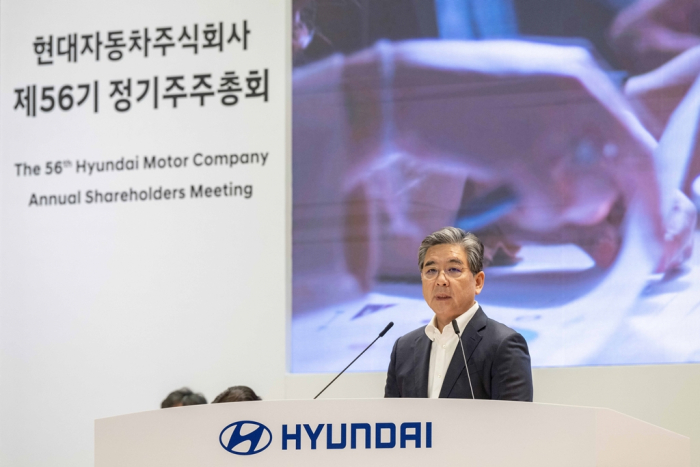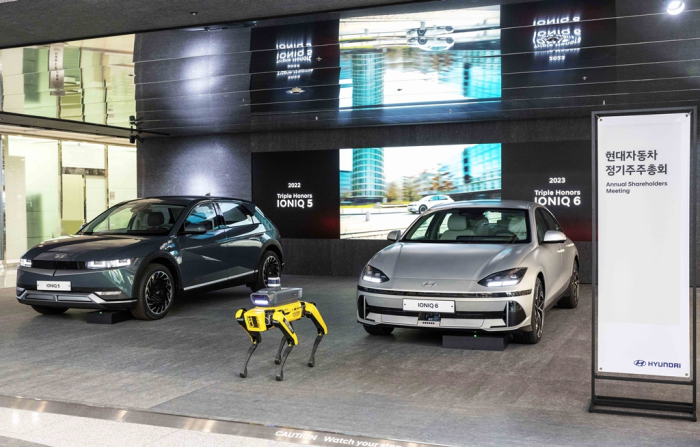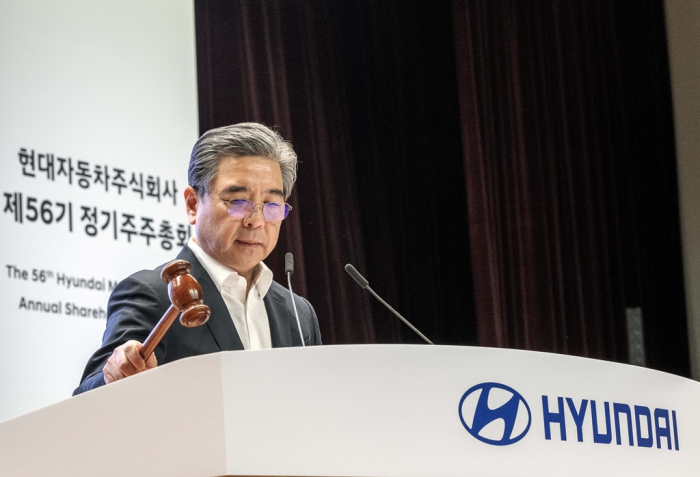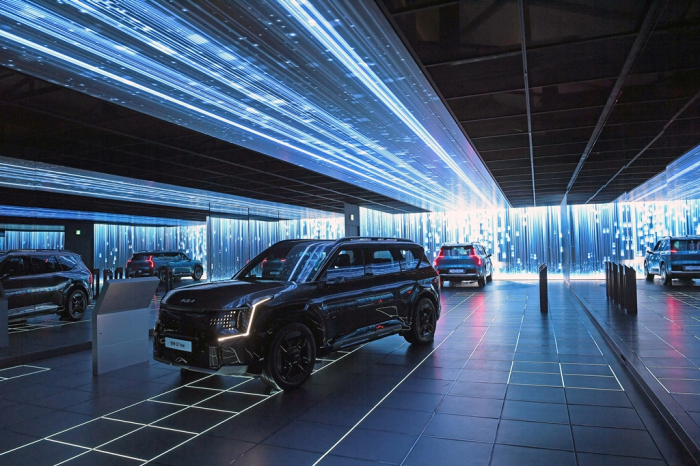Corporate strategy
Hyundai vows to cut costs, seek shift toward SDVs as EV uptake slows
The automaker will establish an advanced vehicle platform headquarters to lead its SDV projects
By Mar 21, 2024 (Gmt+09:00)
3
Min read
Most Read
LG Chem to sell water filter business to Glenwood PE for $692 million


KT&G eyes overseas M&A after rejecting activist fund's offer


Kyobo Life poised to buy Japan’s SBI Group-owned savings bank


StockX in merger talks with Naver’s online reseller Kream


Meritz backs half of ex-manager’s $210 mn hedge fund



South Korea’s top automaker Hyundai Motor Co. has vowed to sharpen its electric vehicle price competitiveness through tech advancement and efficient manufacturing process, following in the footsteps of its rivals to cut costs as the car industry's prospects are clouded by slower-than-expected EV uptake.
Hyundai Motor Chief Executive Chang Jae-hoon said on Thursday the company’s main business strategy for this year is to enhance its EVs’ price competitiveness.
In a speech during the automaker’s annual general meeting (AGM), he also said Hyundai’s push for a software-defined vehicle (SDV) strategy will go into full swing this year.
“With deepening global economic volatility and rapidly weakening consumer demand for EVs, we expect tough business conditions this year,” the CEO told shareholders at the AGM.
He expressed concerns over intensifying competition among EV makers, which have initiated aggressive EV price cuts to appeal to price-conscious consumers.

To improve Hyundai EVs’ price and technological competitiveness, he said the company will seek vehicle design and process innovation as well as cost cuts through an efficient vehicle lineup and strengthened value chains, particularly in emerging markets.
However, the CEO said Hyundai will still roll out the mid- and large-sized electric SUVs planned for this year.
After years of accelerating growth, electric car sales across the globe seem to be entering a go-slow phase as drivers wait for better, cheaper models.
While major EV makers, including Tesla Inc. and BYD Co., have begun slashing prices on their flagship models, battery makers are scrapping or delaying their production expansion plans.
Last November, LG Energy Solution Ltd., one of the world’s top battery makers, and US carmaker Ford Motor Co. said they were abandoning their planned battery manufacturing joint venture in Turkey amid growing concerns over the slowing pace of EV adoption.

The cancellation reflects the rapidly evolving nature of the EV industry with carmakers and battery producers taking a more cautious approach in navigating changing demand and market trends.
Ford’s scrapped JV project with LG follows a similar decision in January 2023 to cancel a $3.2 billion battery JV in Turkey with another Korean battery maker, SK On Co.
TO ESTABLISH NEW ADVANCED VEHICLE PLATFORM DIVISION
Chang, whose term as CEO was extended for another three years during the AGM, said that Hyundai will set up a new business headquarters, which will be responsible for developing advanced vehicle platforms as part of its push to turn vehicles into software-defined cars.
“All our vehicles will eventually be SDVs,” he said.

Earlier this year, 42dot Inc., Hyundai Motor’s self-driving technology unit, said it would partner with Samsung Electronics Co. to jointly develop an artificial intelligence-powered SDV platform.
SDVs, often referred to as smartphones on wheels, enable constant and seamless upgrades of a car’s functions through an over-the-air system throughout the car’s lifetime.
As the automotive industry’s rivalry to win the market with hardware advances is nearly reaching its limit, Hyundai has turned its focus to software upgrades like in-vehicle information (IVI) systems and self-driving technology.
42dot plans to introduce a new AI-powered SDV platform with Samsung Exynos Auto chips by 2025.
Write to Jae-Fu Kim at hu@hankyung.com
In-Soo Nam edited this article.
More to Read
-
 AutomobilesHyundai Motor, Toyota compete to take upper hand in Brazil
AutomobilesHyundai Motor, Toyota compete to take upper hand in BrazilMar 10, 2024 (Gmt+09:00)
3 Min read -
 EarningsHyundai Motor, Kia: S.Korea’s highest earners, Tesla’s biggest rival in US
EarningsHyundai Motor, Kia: S.Korea’s highest earners, Tesla’s biggest rival in USJan 25, 2024 (Gmt+09:00)
5 Min read -
 Korean innovators at CES 2024Hyundai’s 42dot, Samsung to develop AI-powered SDV platform
Korean innovators at CES 2024Hyundai’s 42dot, Samsung to develop AI-powered SDV platformJan 10, 2024 (Gmt+09:00)
2 Min read -
 BatteriesLG Energy, Ford’s battery JV in Turkey scrapped as EV uptake slows
BatteriesLG Energy, Ford’s battery JV in Turkey scrapped as EV uptake slowsNov 12, 2023 (Gmt+09:00)
3 Min read -
 BatteriesKorea's SK On scraps $3.2 bn Turkey EV battery factory plan
BatteriesKorea's SK On scraps $3.2 bn Turkey EV battery factory planJan 09, 2023 (Gmt+09:00)
2 Min read
Comment 0
LOG IN


